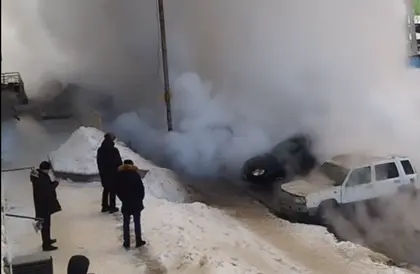Spurting hot steam resulting from the burst of a pipe delivering central heating water has injured five people with scalding injuries, at least two of which were hospitalized as steam engulfed a street in Novosibirsk, the largest city in Siberia and Russia’s third-largest city.
An eyewitness talked of the upsetting scenes that were faced when it happened.
JOIN US ON TELEGRAM
Follow our coverage of the war on the @Kyivpost_official.
“I saw this man who came just from the intersection with Kotovsky. It was clear that he was completely bent over. And we took him to the flower shop. He took off his socks, pulled up his pants, and all his skin peeled off there,” said an eyewitness in an interview with a local news outlet.
In a video, thick clouds of steam reaching as high as seven floors could be seen rising into the air. The leakage has rendered locals with no hot water and heating as the temperature is expected to drop to as low as -27 Celsius (-16.6 Fahrenheit) this week.
Andrey Travnikov, governor of the Novosibirsk region, said yesterday’s incident was a “consequence” of an earlier pipe leakage that took place on Jan. 11, which affected over 100 apartment buildings.
The Novosibirsk City Hall said yesterday that 200 houses were “in the shutdown zone” in a social media announcement, leaving those inside with no heating or hot water in freezing temperatures.
Another announcement said the burst pipe from yesterday had been laid in 1963 and was last repaired in 1990 – a sign that Russia’s aging utility system, coupled with the lack of maintenance, is likely to have been the cause of the incidents.

French Policy Playing Into Iranian and Russian Hands
A local newspaper reported that up to 2,500 houses in Novosibirsk could be affected by the incidents and left without heating.
Yesterday’s incident, coupled with the incident on Jan. 11, has attracted angry comments from locals.
“Exactly a week! I will repeat the question that I wrote here on January 11 – what should happen, how many people should suffer and how, so that you finally get down to real business and order is restored in the housing and communal services system?!!! Why should everything be done only when it has led to large-scale accidents and affected people!!!!” responded a user.
“Man-made disaster already. Not an accident,” another user commented.
Under an announcement of officials meeting to resolve the crisis, more complaints of government negligence were being made.
“What disgusting faces, they should have worked in the summer and not conferred now. All regional governments and the entire mayor’s office and administration resign,” one user wrote.
Novosibirsk was the latest city hit by a wave of utility crisis that has spread all the way from the Far Eastern port city of Vladivostok to the suburbs of Moscow.
Svetlana Razvorotneva, deputy chairman of Russia’s State Duma Committee on Housing and Communal Services, estimated that 80 percent of utility networks were in need of repair or replacement.
As recently reported by Kyiv Post, a series of pipe bursts and boiler room malfunctions have taken out heating for residents in Solnechnogorsk, a town 70 km northwest of Moscow.
While heating pipe bursts and boiler room malfunctions are not unheard of in both Ukraine and Russia, the recent surge of such cases in Russia is likely a result of decades of disrepair, which can be attributed to prolonged government negligence and, in some cases, corruption.
The wave of unprecedented utility incidents could fuel further dissent within the Russian population ahead of Russia’s March presidential election, especially considering how Moscow continued to favor the war in Ukraine over public spending in its 2024 federal budget.
You can also highlight the text and press Ctrl + Enter






